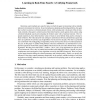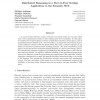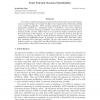JAIR
2006
15 years 1 months ago
2006
In recent years, CP-nets have emerged as a useful tool for supporting preference elicitation, reasoning, and representation. CP-nets capture and support reasoning with qualitative...
JAIR
2006
15 years 1 months ago
2006
The treatment of exogenous events in planning is practically important in many realworld domains where the preconditions of certain plan actions are affected by such events. In th...
JAIR
2006
15 years 1 months ago
2006
Real-time search methods are suited for tasks in which the agent is interacting with an initially unknown environment in real time. In such simultaneous planning and learning prob...
111
Voted
JAIR
2006
15 years 1 months ago
2006
Distributed Constraint Satisfaction (DCSP) has long been considered an important problem in multi-agent systems research. This is because many real-world problems can be represent...
100
Voted
JAIR
2006
15 years 1 months ago
2006
Open distributed multi-agent systems are gaining interest in the academic community and in industry. In such open settings, agents are often coordinated using standardized agent c...
133
Voted
JAIR
2006
15 years 1 months ago
2006
A decision process in which rewards depend on history rather than merely on the current state is called a decision process with non-Markovian rewards (NMRDP). In decisiontheoretic...
94
Voted
JAIR
2006
15 years 1 months ago
2006
Logical hidden Markov models (LOHMMs) upgrade traditional hidden Markov models to deal with sequences of structured symbols in the form of logical atoms, rather than flat characte...
JAIR
2006
15 years 1 months ago
2006
In this paper, we introduce DLS-MC, a new stochastic local search algorithm for the maximum clique problem. DLS-MC alternates between phases of iterative improvement, during which...
86
Voted
JAIR
2006
15 years 1 months ago
2006
In a peer-to-peer inference system, each peer can reason locally but can also solicit some of its acquaintances, which are peers sharing part of its vocabulary. In this paper, we ...
107
click to vote
JAIR
2006
15 years 1 months ago
2006
A -model is a satisfying assignment of a Boolean formula for which any small alteration, such as a single bit flip, can be repaired by flips to some small number of other bits, yi...




